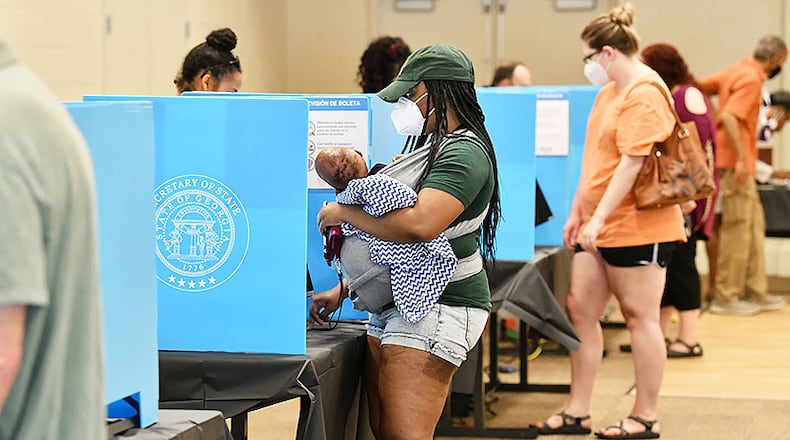A federal judge Friday denied an effort to convert Georgia elections to paper ballots filled out by hand, declining to throw out the state’s new voting system after its first statewide test in this spring’s primaries.
But U.S. District Judge Amy Totenberg allowed the elections security lawsuit to move forward based on evidence of problems in the state’s June 9 primary, when some voters waited in hours-long lines caused by social-distancing requirements, precinct closures, high turnout and difficulties operating election equipment.
The ruling means voters will continue casting ballots on Georgia’s new voting computers, which use touchscreens and printed-out paper ballots. Until this year, voters lacked a paper ballot.
The lawsuit argued that the state’s dependence on electronic voting made elections susceptible to manipulation or hacking. The plaintiffs said voters couldn’t truly confirm the accuracy of their printed ballots, which encode votes in bar codes for tabulation.
“The court appreciates the plaintiffs’ central claim addresses the problem posed by tabulating votes based on a bar code that cannot be verified by voters in conjunction with the lack of meaningful, rigorous auditing,” Totenberg wrote. “However ... the court finds that plaintiffs’ showing has been insufficient” because it was based on information presented before this year’s elections.
An attorney for the Coalition for Good Governance, one of the plaintiffs, said he plans to file a new motion with evidence from the primaries. He said the elections exposed how ballots can’t be meaningfully audited, scanners missed counting some partially filled bubbles, and bright touchscreens failed to ensure ballot secrecy.
“It’s crucial for voters not only to have their vote counted, but to have confidence that the system could be trusted,” said the attorney, Bruce Brown. “We believe there’s enough time to get meaningful relief in time for November’s election.”
The ruling comes nearly a year after Totenberg previously ruled that Georgia must use paper ballots in 2020′s elections, but it would have been too disruptive to switch to paper ballots before last year’s elections.
Since then, the state completed its purchase of the $104 million voting system and deployed it for statewide use in the primaries.
Problems operating the voting system contributed to delays on election day. Some poll workers struggled to boot up equipment, find passwords for voter check-in tablets and encode voter access cards.
Election officials have improved poll worker training and plan to install technicians in every polling place for November’s presidential election to avoid technical difficulties.
The secretary of state’s office didn’t comment on Totenberg’s ruling.
Voters will next use Georgia’s election system in Tuesday’s runoff election, which includes races for the U.S. House of Representatives, Georgia General Assembly, district attorney offices and judicial seats.
About the Author
Keep Reading
The Latest
Featured




